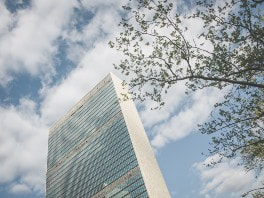 Image by Thomas Eidsvold on Unsplash
Image by Thomas Eidsvold on Unsplash The Commission on the Status of Women (CSW) took place in New York, late March. The CSW is instrumental in promoting women’s rights, documenting the reality of women’s lives throughout the world, and shaping global standards on gender equality and the empowerment of women. The priority theme for this year’s session was: “Women's full and effective participation and decision-making in public life, as well as the elimination of violence, for achieving gender equality and the empowerment of all women and girls.”
Like-minded countries (EU, Mountains (Norway, Canada, Iceland, Australia, NZ, Switzerland) and the Santiago Group (Latin America countries), including the US delegation) were quite aligned towards the CSW-text, but constantly faced the conservative voices from Russia, Holy See, Saudi Arabia and Iraq. While an agreed outcome was eventually adopted, the UN Member States were not able to agree on key issues - such as sexual and reproductive health and rights, Young Women and Girls’ participation, intimate partner violence, Multiple and Intersecting Forms of Discrimination, Women, Peace and Security and Women’s Human Rights Defenders (WHRD).
Like-minded countries (EU, Mountains (Norway, Canada, Iceland, Australia, NZ, Switzerland) and the Santiago Group (Latin America countries), including the US delegation) were quite aligned towards the CSW-text, but constantly faced the conservative voices from Russia, Holy See, Saudi Arabia and Iraq. While an agreed outcome was eventually adopted, the UN Member States were not able to agree on key issues - such as sexual and reproductive health and rights, Young Women and Girls’ participation, intimate partner violence, Multiple and Intersecting Forms of Discrimination, Women, Peace and Security and Women’s Human Rights Defenders (WHRD).
What happened?
More than previous years, it was clear that some delegations (led by Russia) were determined to undermine and delay progress in any negotiations, to force others to compromise on language that goes below red lines to reach consensus at any cost.
Language that was not previously controversial was heavily objected to. This included multiple and intersecting forms of discrimination, which is agreed language from CSW63 and other fora. These objections also extended to language around references on gender, sexual and gender-based violence, women human rights defender and resolution 1325. Discussions on SRHR were not even included in the negotiations, as the facilitator kept postponing discussions on these ‘contentious’ issues.
Finally, UN Women and the Chair presented a weak version of the text, undermining the role of the facilitator and Member States in trying to bring about a strong and inclusive agreement. This presents a dangerous precedent for future sessions where a few Member States that have been isolated in the negotiations seek to employ all tactics to undermine the process and tilt the outcome in their favour.
More than previous years, it was clear that some delegations (led by Russia) were determined to undermine and delay progress in any negotiations, to force others to compromise on language that goes below red lines to reach consensus at any cost.
Language that was not previously controversial was heavily objected to. This included multiple and intersecting forms of discrimination, which is agreed language from CSW63 and other fora. These objections also extended to language around references on gender, sexual and gender-based violence, women human rights defender and resolution 1325. Discussions on SRHR were not even included in the negotiations, as the facilitator kept postponing discussions on these ‘contentious’ issues.
Finally, UN Women and the Chair presented a weak version of the text, undermining the role of the facilitator and Member States in trying to bring about a strong and inclusive agreement. This presents a dangerous precedent for future sessions where a few Member States that have been isolated in the negotiations seek to employ all tactics to undermine the process and tilt the outcome in their favour.

 RSS Feed
RSS Feed